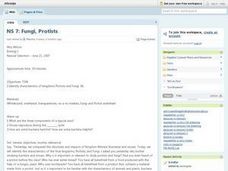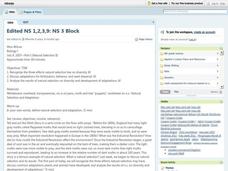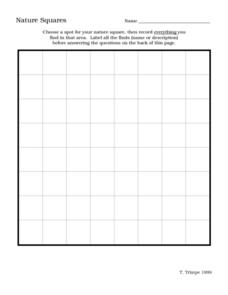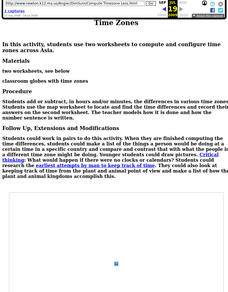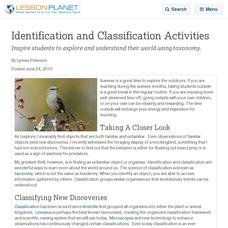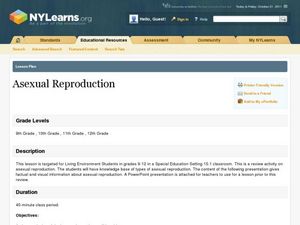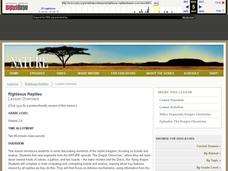Curated OER
Classification/Taxonomy/Statistics Review
"Does King Phillip Cry Over Flimsy Grass Stems?" You might not answer that question with this exhaustive worksheet, but your biology class will get the full scoop on the hierarchy of biological classification with this resource. It...
Curated OER
Chicago: The City in Art, 1995-2000
Students examine a mural of animals and talk about animal classification. They act as scientists and keep a record, called a Jungle Journal, of plants and animals they observe while studying the rainforest.
Virginia Department of Education
Cell Parts
What do a bird, an egg, a rabbit, and a toad all have in common? This fun-filled resource explains the similarities and differences between cells and how all cells are similar, yet all are different. Learners begin by depicting a...
Curated OER
Finding Fungi in the World Around Us
These lesson ideas will help your students explore the diversity of Kingdom Fungi.
Curated OER
NS 7 Fungi , Protists
Students identify characteristics of kingdoms Protista and Fungi. They complete a worksheet of protists and fungi. Students review the familiar characteristics of plants, animals, bacteria and viruses. They need to familiarize...
Curated OER
Amoeba
In this amoeba worksheet, high schoolers read about the structures of the amoeba and their functions. They answer twelve questions about the amoeba and color given structures on a diagram of an amoeba.
Curated OER
Practice with Ions
In this ions worksheet, students answer questions about atoms that have gained or lost electrons, they find the number of electrons atoms tend to gain or lose and they answer questions about bonding in atoms. They answer 6 questions...
Curated OER
All About Seeds!
How do fruits relate to flowers and seeds? Identify the seeds and their purpose with a coloring activity for kindergartners. Once they color the seeds of apples, bananas, and peas (among others), kids get hands-on experience with bean...
Curated OER
Celebrate Endangered Species Day at Your School
Learn how your school can join numerous conservation organizations in celebrating Endangered Species Day on May 17th.
Curated OER
From Curiosity Cabinet to Museum Collection
Students study binomial nomenclature and museum-based research. They create a curiosity box, label the objects in their curiosity box , develop a classification scheme for the objects, and create a database of all objects collected by...
Curated OER
Introductory Bacteria and Virus Worksheet
Compare and contrast eukaryotes, prokaryotes, and viruses with a chart and a Venn diagram. Beginning microbiologists consider motility, reproductive ability, DNA content, and the presence of organelles. They write short answers to...
Curated OER
Invertebrates
Students identify the characteristics common to all animals. In groups, they compare the characteristics between the animals and how they are divided. To end the lesson, they compare the eight phyla of invertebrates and review the...
Curated OER
Natural Selection And Evolution
Students investigate the concept of evolution and how natural selection is used as an indicator that evolution has happened. They recognize the three effects it has on diversity and how adaptations can develop. Diversity is explained as...
Curated OER
Nature Squares
In this nature observation worksheet, students set up a grid on a small plot of land and record all biotic and abiotic items in the grid. They complete 5 short answer questions based on their observations.
Curated OER
Shapes, Patterns, and Plants
Students imagine they are animals in the Palace Facade painting. For this Palace Facade lesson plan, students observe and discuss the geometric and organic shapes in the painting shown to them.
Curated OER
Time Zones
Fifth graders locate different time zones. In this time zones lesson, 5th graders label the different time zones. Students research the different ways man has kept time throughout history. Students also compute the differences in time...
Curated OER
Global Resources: What Will You Do with Your Power?
Young scholars examine the human impact on natural resources. They read and discuss an article, evaluate nations regarding their environmental problem-solving, develop a presidential speech on the environment, and conduct a natural...
Curated OER
Identification and Classification Activities
Explore and understand your world with taxonomy.
Curated OER
Science: Grade 4
Building a scientific vocabulary is important for all students and this presentation provides a list of words typical to 4th grade science curriculum. Tip: Adding images to this resource will make the vocabulary more accessible to ELLs...
Curated OER
Make Sense of Nature
Learners participate in this program that heightens their awareness and curiosity of nature as well as their sense of adventure and exploring new surroundings. They identify and choose an object from nature after exploring it with other...
Curated OER
Taxonomy Project
Students act as a taxonomist and, given a certain situation, classify existing organisms.
Curated OER
Asexual Reproduction
Sixth graders investigate how asexual reproduction produces single-parent offspring. They use plants and yeast to demonstrate vegetative propagation and budding in a laboratory. Students draw five different types of asexual reproduction.
PBS
Righteous Reptiles
Young scientists write and draw about their knowledge of reptiles. They also view a nature video focusing on lizards and snakes, complete a chart comparing and contrasting them. Next, they focus on the defense mechanisms that they...
Curated OER
Goals of the Diversity of Life Unit
Students are introduced to the unit on the importance of diversity of life and the role that interdependence plays in our worlds. this is part of a multi-lesson unit on the diversity of life.






